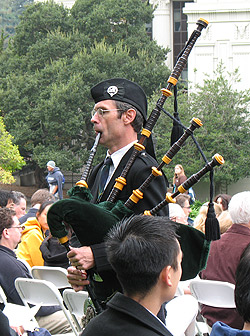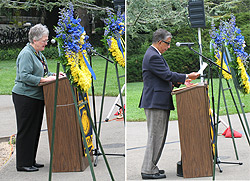Berkeleyan
 Lyn Hejinian, professor of English (left), read a poem by the ancient Chinese poet Tu Fu, following a pair of songs by the visiting Threshold Choir (right). Music and poetry have been elements of the campus memorial ceremony for the five years of its existence, combined with the reading of the names of the past year's deceased - colleagues and friends missed by so many. (Jonathan King photos) |
A tradition firmly made: recalling those we've lost
![]()
| 04 October 2006
Last week's campus memorial ceremony, conducted to honor those among our community who died during the previous year, was, as always, a deeply moving experience. Now in its fifth year, the ceremony has, for all its gravitas, become as much a part of Berkeley's annual cycle of events as Charter Day or the Big Game.
 Bagpiper Jeff Campbell made his way through the assembled mourners at the end of his procession from Moffitt Library to the ceremony site. |
Following the pattern established at the first memorial, in 2002, the ceremony began with the procession of a lone bagpiper from Moffitt Library to the site of the service, near the flagpole between California Hall and the Valley Life Sciences Building. Chancellor Birgeneau welcomed the audience of colleagues, friends, relatives, and others, then made way for those who would read the names of the 91 departed - faculty, staff, and students - on this year's list. The dolorous roll was called by Academic Senate Chair William Drummond (faculty and emeriti, plus academics and academic retirees), Staff Ombuds Office Director Margo Wesley (active and retired staff), and ASUC President Oren Gabrel (students).
Music and poetry played their now-traditional roles as well. Two English-department faculty members - lecturer Geoffrey O'Brien and Professor Lyn Hejinian - read poems suited to the event. The Threshold Choir, a group of volunteers who vocalize at the bedsides of the sick and dying, sang "My Grateful Heart" and "Remember Me"; a bit later, the thrilling soprano of Candace Johnson, a chancellor's postdoctoral fellow, essayed a remarkable rendition of "I Believe." And finally the bagpipes keened once more, as the piper retreated to the evocative strains of "Amazing Grace" and a flock of white doves was released, tracing a snowy gyre skyward as the audience, in utter silence, watched them disappear into the cloudless gray sky.
'Death reports' fill a crucial role
The annual ceremony is planned by Carol Hoffman, campus work/life coordinator at University Health Services, and Helena Weiss-Duman, assistant director of campus events and ceremonies in University Relations. Among their duties is compiling the definitive list of those whose deaths have occurred during the preceding 12 months - a task made difficult at times because many campus units neglect to report deaths to the central campus.
 Among those who read the names of the deceased were Margo Wesley (left) and William Drummond. |
Though names of the deceased are compiled from a variety of sources, the most important source are formal death notifications ("death reports") submitted by the deceased person's department. Though filed somewhat differently for the deaths of students, faculty, and staff, the death reports all serve essentially the same purpose: to coordinate the flow of information about a campus-related death so that key offices can respond in a timely, respectful, and coordinated way. These responding units can include the Chancellor's Office, Human Resources' benefits unit, Public Affairs, Payroll, Alumni Records, and the University Archivist.
In addition, departments and units are encouraged to appoint an employee to act as a communications coordinator to make sure that death reports are filed and that colleagues, relatives, and friends of the deceased know what resources are available to them for sending condolence messages, dealing with grief, and so on.
To learn more about the issues that arise when someone you work with dies, as well as about the campus resources available to help faculty and staff at such a difficult time, visit the "Responding to Death" website at death-response.chance.berkeley.edu.

